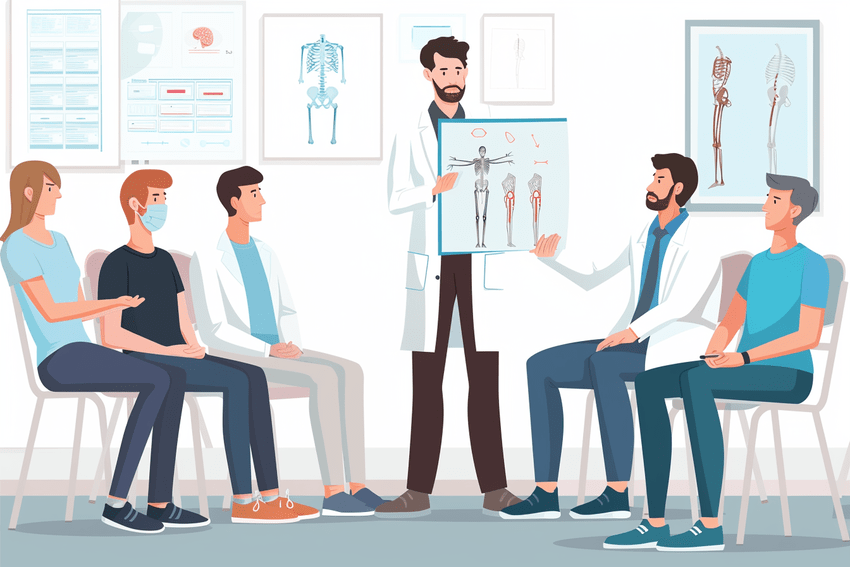Understanding Musculoskeletal Injuries: Causes, Symptoms, and Treatment
Did you know that musculoskeletal injuries account for a significant portion of work-related health issues and are a leading cause of disability worldwide? In fact, these injuries not only affect our ability to work but also impact our daily lives and hobbies. In this article, we will explore the various types of musculoskeletal injuries, their causes, symptoms, diagnostic tools, treatment options, and prevention strategies to help you maintain optimal musculoskeletal health.
Key Takeaways
- Musculoskeletal injuries can be acute, chronic, repetitive use or overuse and are caused by various activities and habits.
- Symptoms include pain, numbness/tingling and muscle weakness/atrophy. Diagnosis is aided by X-rays etc.; treatment options range from conservative therapies to surgery.
- Prevention strategies involve creating a safe work environment, commitment to proper technique in sports, adopting healthier daily life habits.
Types of Musculoskeletal Injuries
Our musculoskeletal system is a complex network of bones, muscles, tendons, ligaments, and other structures that not only provide support but also enable movement.
Injuries to this intricate system can be classified into four main categories:
- Acute injuries
- Chronic injuries
- Repetitive use injuries
- Overuse injuries
These injuries can occur due to various factors, including work-related activities, sports, and daily life habits, and can significantly impact our overall health and well-being.
Acute Injuries
Acute injuries occur suddenly and are typically caused by a specific event or trauma, such as a fall, collision, or sudden twist. Injuries to tendons or ligaments, such as sprains, strains, and ruptures, make up the largest single group of musculoskeletal injuries affecting the musculoskeletal system. Some common examples of acute injuries include carpal tunnel syndrome, radial tunnel syndrome, and tennis elbow. Factors such as the duration of activity, the force required to complete the activity, the workplace environment, and work postures can influence the occurrence of acute musculoskeletal injuries, often leading to muscle pain and muscle injury.
Treatment options to treat musculoskeletal pain in cases of acute injuries aim to relieve pain and promote healing. These may include:
- Physiotherapy
- Heat or cold therapy
- Stretching
- Rest
- Medications
In some cases, more invasive treatments or surgery may be necessary, depending on the severity and location of the injury.
Seeking timely medical care for acute injuries is key to correct diagnosis and treatment. Postponing medical care could result in complications and extend the healing process, adversely affecting your overall musculoskeletal health.
Chronic Injuries
Chronic injuries, on the other hand, develop slowly over time and persist, often due to repetitive stress or strain on the body. These injuries are characterized by dull pain, aches, or soreness, and can affect various parts of the musculoskeletal system, such as tendons, ligaments, and joints. For instance, rheumatoid arthritis is a common chronic injury that causes joint pain and inflammation, particularly in the hands and feet.
Comprehending the distinction between tendons and ligaments becomes significant when we delve into chronic injuries and connective tissue diseases. Tendons act as connecting tissue between muscles and bones. Ligaments on the other hand, connect bones to one another. Both structures play a vital role in maintaining joint stability and controlling the boundaries of joint movements.
Age is one of the most prominent risk factors for chronic injuries like osteoarthritis, as the wear and tear on joints accumulate over time. Proper management of chronic injuries may involve medication, physiotherapy, and lifestyle modifications, such as weight loss and regular exercise.
Repetitive Use Injuries
Repetitive Use Injuries are caused by the prolonged and repetitive use of muscles, resulting in inflammation and potentially permanent damage. These injuries can occur due to postural deficiencies, repeated shoulder motions, physical trauma, and advancing age. Common indications of Repetitive Use Injuries include tendonitis, tenosynovitis, myelopathy, tennis elbow, wrist injuries, lower back injuries, and lower leg and ankle injuries.
Mechanization, involving the use of machinery or technology to relieve the strain on the affected muscles, serves as a potential treatment option for Repetitive Use Injuries. Other treatment options may include rest, physiotherapy, and medication to manage pain and inflammation.
Prevention of Repetitive Use Injuries calls for the following measures:
- Identification and rectification of root causes, which might include poor posture or erroneous work techniques
- Modifications to the work environment and equipment
- Regular breaks and stretching exercises
These measures can help reduce the risk of developing these injuries.
Overuse Injuries
Overuse injuries result from excessive strain on muscles, tendons, and joints over an extended period, often due to repetitive activities or inadequate biomechanics. Potential causes of overuse injuries include repetitive activities, poor biomechanics, inadequate rest, and insufficient warm-up. Symptoms of overuse injuries may include pain, swelling, stiffness, and a reduction in range of motion.
Treatment options for overuse injuries may involve:
- Rest
- Physiotherapy
- Medications
- Surgery
Preventing overuse injuries requires identifying and addressing the contributing factors, such as improper technique or inadequate rest.
Regular breaks, stretching exercises, proper warm-up routines, and resolution of biomechanical issues, when inculcated, can mitigate the risk of overuse injuries and uphold overall musculoskeletal health.
Common Causes of Musculoskeletal Injuries
As mentioned earlier, various factors contribute to musculoskeletal injuries, including work-related factors, sports activities, and daily life habits. Each of these categories presents unique challenges and risks that can lead to injuries.
Comprehending and dealing with these risks can considerably lessen the chances of developing musculoskeletal injuries, enhancing overall musculoskeletal health.
Work-Related Factors
Workplace conditions and tasks play a significant role in the development of musculoskeletal injuries. Factors such as repetitive motions, awkward postures, and heavy lifting can lead to work-related musculoskeletal disorders (WMSDs). Symptoms of WMSDs include muscle pain, joint stiffness, muscle tension, redness, and inflammation of the affected area, among others.
To prevent work-related musculoskeletal injuries, employers and employees can implement various strategies. These include:
- Providing training on proper lifting techniques
- Making ergonomic adjustments to workstations
- Promoting warm-up exercises before starting work
- Fostering a supportive work environment
- Encouraging open communication about potential ergonomic hazards
These strategies can help reduce the risk of injury.
Through the implementation of these workplace prevention strategies, employees and employers can jointly foster a safer and healthier work environment, ultimately minimizing the risk of musculoskeletal injuries.
Sports Activities
Sports activities, particularly high-impact and contact sports, can contribute to musculoskeletal trauma when proper techniques and precautions are not observed. Injuries can occur due to the physical demands of the sport, inadequate warm-up, or poor equipment, leading to acute or chronic injuries.
To prevent sports-related injuries, athletes should:
- Focus on proper technique
- Use appropriate equipment
- Prioritize conditioning and physical fitness
- Engage in warm-up exercises
- Stretch before and after activity
- Incorporate strength training into their routine
These measures can help reduce the risk of injury and improve overall performance.
With the adoption of necessary precautions and a consistent commitment to proper techniques, athletes can substantially diminish their chances of incurring musculoskeletal injuries during sports activities.
Daily Life Habits
Everyday habits, such as maintaining poor posture, failing to adequately stretch, and insufficient exercise, can contribute to the development of musculoskeletal injuries. Over time, these habits can place unnecessary strain on the musculoskeletal system, leading to pain, stiffness, and a reduced range of motion.
To prevent injuries in daily life, it is essential to develop healthy habits that support musculoskeletal health. These may include:
- Regularly engaging in physical activity
- Stretching
- Maintaining proper posture while sitting, standing, and lifting objects
- Incorporating strength training and flexibility exercises
These habits can further support overall musculoskeletal health and reduce the risk of injury.
Adoption of healthier daily habits and management of potential risk factors can greatly lessen the odds of individuals experiencing musculoskeletal injuries, allowing them to enjoy a more active and pain-free life.
Symptoms and Diagnosis
Recognizing the symptoms of musculoskeletal pain and injuries and seeking appropriate diagnosis and treatment is crucial in managing these conditions effectively.
Various diagnostic tools and tests are available to help healthcare professionals identify the underlying cause of the injury and determine the most suitable course of treatment.
Symptoms
Musculoskeletal injuries can present with a wide range of symptoms, including:
- Low back pain
- Numbness
- Tingling
- Muscle weakness
- Atrophy
These symptoms can be associated with chronic low back pain, which is a widespread issue. Pain caused by chronic low back pain is typically felt in the lower extremity, known as radicular pain or sciatica.
Repetitive strain injuries may present with numbness in the arms, hands, or legs, aches and pain in the joints, shoulder and back pain, and tingling or burning sensations in the arms, legs, and feet. In the late stages of work-related musculoskeletal disorders, symptoms may include aching, fatigue, and weakness that persist even when at rest, along with difficulty sleeping and performing light duties.
Paying close attention to these symptoms and seeking the necessary medical care is advised. Early diagnosis and treatment can help prevent further damage and complications, ultimately supporting better musculoskeletal health.
Diagnostic Tools
Various diagnostic tools and tests are available to help healthcare professionals identify and assess musculoskeletal injuries. These tools may include:
- X-rays
- Bone scanning
- CT and MRI scans
- DXA
- Ultrasonography
Laboratory and electronic tests, such as electroneuromyography (ENMG) and magnetic resonance imaging, can also be used to ascertain nerve or muscle damage.
The electrodiagnostic functional assessment (EFA) is a diagnostic method based on electromyography that provides a high diagnostic rate for work-related musculoskeletal disorders of soft tissue injury. Infrared thermography, another diagnostic tool, boasts a high accurate rate when identifying musculoskeletal injuries.
With the aid of these diagnostic tools and tests, healthcare professionals can pinpoint the root cause of a musculoskeletal injury and devise a targeted treatment plan to resolve the issue and expedite healing.
Treatment Options for Musculoskeletal Injuries
There are various treatment options available for managing and recovering from musculoskeletal injuries, ranging from conservative treatments like physiotherapy and medication to more invasive surgical interventions.
The choice of treatment largely depends on the severity of the injury, the underlying cause, and the individual’s overall health and preferences.
Conservative Treatments
Conservative treatments for musculoskeletal injuries typically involve non-surgical approaches, such as physiotherapy, medication, and lifestyle modifications. These treatments aim to manage pain and inflammation, restore function, and prevent further damage. Examples of medications used to treat musculoskeletal injuries include oral acetaminophen, NSAIDs, and low-dose glucocorticoids.
Physiotherapy can be instrumental in the recovery process as it aids patients in maintaining joint mobility and fortifying muscle groups. Occupational therapy may also be beneficial in addressing functional limitations and helping individuals adapt their daily activities to accommodate their injury.
In some cases, lifestyle modifications, such as weight loss, regular exercise, and maintaining good posture, may also help in managing musculoskeletal injuries and improving overall health.
Surgical Treatments
In more severe or unresponsive cases, surgical interventions may be necessary to address musculoskeletal injuries. Examples of surgical treatments include:
- Soft tissue repair
- Open reduction
- Osteotomy
- Joint replacement
- Joint fusion surgery
- Various types of spine surgery, such as anterior cervical discectomy and fusion and lumbar interbody fusion.
The decision to undergo surgical treatment typically depends on the severity of the injury, the individual’s overall health, and the potential benefits and risks of the procedure. Factors such as muscle weakness, neurologic disorders, and diabetes may detrimentally affect the results of certain surgical treatments.
It is generally observed that most patients experience nearly optimal benefits within a period of six months following a successful surgical intervention. However, recovery time and outcomes can vary significantly depending on the specific procedure and individual factors.
Prevention Strategies
Preventing musculoskeletal injuries is a crucial aspect of maintaining overall health and well-being. By implementing various prevention strategies in the workplace, during sports activities, and in daily life, individuals can significantly reduce their risk of injury and enjoy a more active, healthy lifestyle.
Workplace Prevention
Workplace prevention strategies for musculoskeletal injuries involve:
- Creating a safe and healthy work environment that minimizes the risk of injury
- Implementing a workplace ergonomics program
- Conducting risk assessments
- Providing education and training on ergonomics
- Promoting proper lifting techniques
Encouraging employees to engage in warm-up exercises before starting work and supporting prophylactic measures, such as strength training and stretching, can also help reduce the risk of injury. Additionally, fostering a supportive work environment and encouraging open communication about potential ergonomic hazards can contribute to a safer and healthier workplace.
Implementation of these workplace prevention strategies allows employees and employers to collaborate in reducing the risk of musculoskeletal injuries and fostering a healthier work environment.
Sports-Related Prevention
In sports, proper technique, equipment, and conditioning are essential in preventing sports-related musculoskeletal injuries. Athletes should focus on using correct techniques, wearing appropriate protective gear, and prioritizing physical fitness and conditioning to reduce the risk of injury. Engaging in warm-up exercises, stretching, and strength training can also help reduce the risk of injury and improve overall performance.
Additionally, athletes should pay close attention to their body’s signals and make adjustments as needed, such as taking breaks or altering their training regimen if they experience pain or discomfort to relieve symptoms.
A continued commitment to proper technique, equipment, and conditioning can notably decrease athletes’ risk of sustaining musculoskeletal injuries during sports activities.
Daily Life Prevention
In daily life, habits such as maintaining good posture, using proper lifting techniques, and engaging in regular physical activity can help prevent musculoskeletal injuries. Taking regular breaks from any sustained position, stretching tight muscles, and addressing long-term modifiable predispositions can also help reduce the risk of injury.
Incorporating strength training and flexibility exercises into a daily routine can further support overall musculoskeletal health and reduce the risk of injury. Additionally, adhering to a healthy, non-inflammatory diet and abstaining from smoking can also contribute to overall health and well-being.
Adoption of healthier daily habits and management of potential risk factors can greatly lessen the odds of individuals experiencing musculoskeletal injuries, allowing them to enjoy a more active and pain-free life.
Summary
In conclusion, understanding the various types of musculoskeletal injuries, their causes, symptoms, diagnostic tools, and treatment options is crucial in managing and preventing these conditions effectively. By implementing prevention strategies in the workplace, during sports activities, and in daily life, individuals can significantly reduce their risk of injury and improve their overall musculoskeletal health.
Remember, maintaining good posture, using proper lifting techniques, engaging in regular physical activity, and making healthy lifestyle choices can all contribute to a more active, pain-free life. Take care of your musculoskeletal health today, and enjoy the benefits for years to come.
Frequently Asked Questions
What are 4 types of musculoskeletal injuries?
Musculoskeletal injuries commonly experienced by athletes include fractures, dislocations, sprains, strains, tendonitis, bursitis, carpal tunnel syndrome, ligament sprain, tendon/muscle strain, tension neck syndrome, rotator cuff tendonitis, thoracic outlet compression, radial tunnel syndrome, bone fractures, joint dislocation, direct blows to muscles, bones or joints, overuse injuries, poor posture, and sprains. These injuries are also referred to as repetitive strain injuries (RSIs), repetitive motion injuries, cumulative trauma disorders (CTDs), and work-related upper limb disorders (WRULDs).
What are the 5 injuries to the musculoskeletal system?
Common injuries to the musculoskeletal system in athletes include fractures, dislocations, sprains, strains, tendinitis, and bursitis.
What are 2 signs of a serious musculoskeletal injury?
Signs of a serious musculoskeletal injury can include swelling, redness or difficulty moving a particular body part, as well as numbness, tingling and pain. These signs can appear suddenly or gradually over time.
What are the common symptoms of musculoskeletal injuries?
Common symptoms of musculoskeletal injuries include aches, low back pain, numbness, tingling, muscle atrophy, and weakness.
What diagnostic tools are used to identify musculoskeletal injuries?
Diagnostic tools such as X-rays, bone scanning, CT and MRI scans, DXA, ultrasonography, and EMG can be used to identify musculoskeletal injuries.
Note: This article was written with the help of AI technology and therefore may include incorrect information and discrepancies.

Physiotherapy BSc MCSP HPC PAS
Founder of Crawley Physiotherapy Clinic
HCPC Registration Number PH97986
CSP Registration Number 089576

